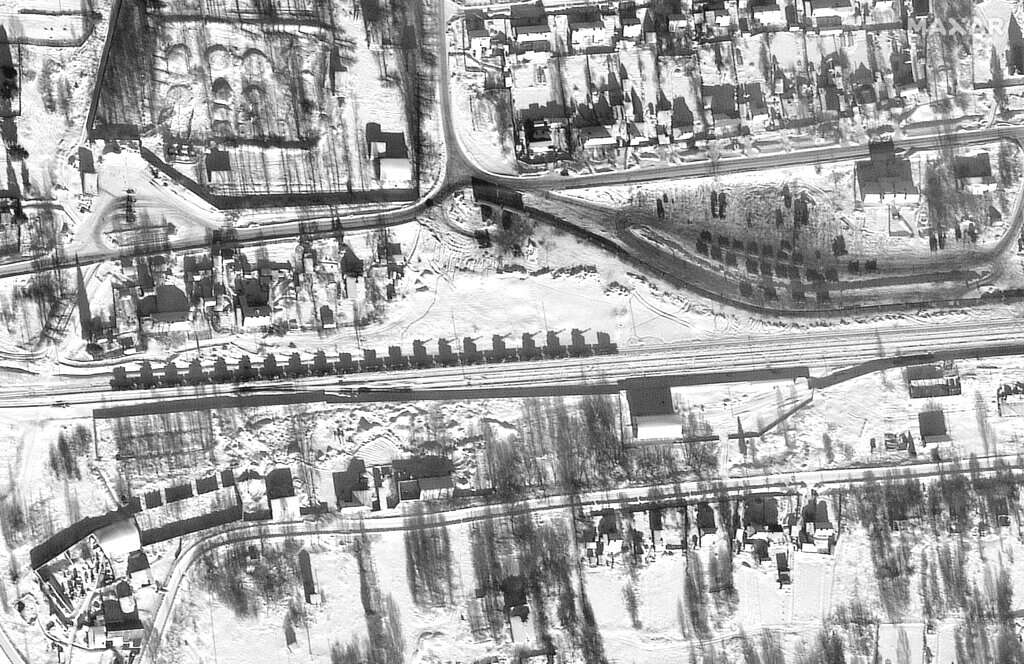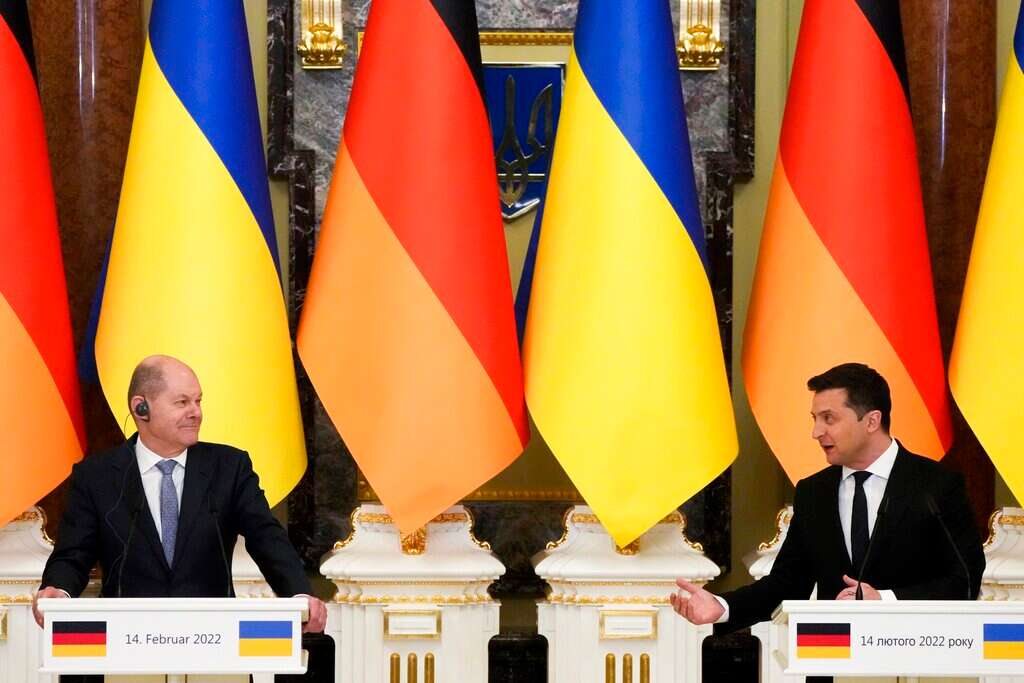Russia has moved some long-range artillery and rocket launchers into firing position, threatening Ukraine, a US official said on Monday.
Follow Israel Hayom on Facebook, Twitter, and Instagram
Some Russian units have left their assembly areas – the bumper-to-bumper formations seen in satellite photos – and are beginning to move into "attack positions," according to the official. This movement marks a change since Sunday, when some of the units had left the assembly areas but had not yet taken what could be viewed as attack positions.
The US believes Russia will attack Ukraine by the end of the week, although it's not yet certain what form it will take, the official said, speaking on condition of anonymity to discuss information not publicly released. CBS News was first to report on the movement of the units.
Satellite images taken over the last 48 hours show increased Russian military activity in Belarus, Crimea and western Russia, including the arrival of helicopters, ground-attack aircraft and fighter-bomber jets at forward locations. The photos also show ground forces leaving their garrisons and combat units moving into convoy formation, according to Maxar Technologies, a commercial satellite imagery company that has been monitoring the Russian buildup.

(AP via satellite image ©2022 Maxar Technologies) AP
A former senior Israeli defense official told Israel Hayom that US President Joe Biden's weakness in other crises across the globe is what invited the Russian aggression toward Ukraine.
The senior official, who is not affiliated with the right-wing camp in Israel, said he believes the "the naïve approach of the current administration, which believes in diplomacy and not in the use of force, is inviting aggression from totalitarian regimes such as China and Russia." According to the official, "There's a direct link between [Russian President Vladimir] Putin's brazenness in threatening Ukraine, and the Chinese aggression toward Taiwan. These are things we didn't see a year ago, and it's not a coincidence. What has changed has been the American policy."
"This is a test for the US and the West," continued the official. "Ukraine is a test case that the whole world is watching."
Ukrainian security and defense council chief Oleksiy Danilov downplayed the threat of invasion but warned of the risk of "internal destabilization" by unspecified forces.
"Today we do not see that a large-scale offensive by the Russian Federation can take place either on (Feb.) 16th or the 17th," he told reporters after meeting lawmakers. "We are aware of the risks that exist in the territory of our country. But the situation is absolutely under control."
As if to show defiance, Ukrainian President Volodymyr Zelenskyy said Wednesday would be a "day of national unity," calling on the country to display the blue-and-yellow flags and sing the national anthem in the face of "hybrid threats."
"Our country today is as strong as ever. It is not the first threat the strong Ukrainian people have faced," Zelenskyy said Monday evening in a video address to the nation. "We're calm. We're strong. We're together. A great nation in a great country."
The country is preparing nonetheless. Kyiv residents received letters from the mayor urging them "to defend your city," and signs appeared in apartment buildings indicating the nearest bomb shelter. The mayor says the capital has about 4,500 such sites, including underground parking garages, subway stations and basements.
Questions do still remain about Putin's intentions, however, and the Kremlin on Monday also signaled it was ready to keep talking with the West about security grievances that led to the current Ukraine crisis, offering hope that Russia might not invade its beleaguered neighbor within days.
On a last-ditch diplomatic trip, Germany's chancellor said there are "no sensible reasons" for the buildup of more than 130,000 Russian troops on Ukraine's borders to the north, south and east, and he urged more dialogue.
Britain's prime minister said Europe is "on the edge of a precipice" – but added, "there is still time for President Putin to step back." France's foreign minister, Jean-Yves Le Drian, told French television that "all elements" were in place for a strong Russian offensive, but "nothing shows today" that Putin has decided to launch one.

Despite the warnings from Washington, London and elsewhere that Russian troops could move on Ukraine as soon as Wednesday, Monday's meeting between Putin and Foreign Minister Sergey Lavrov suggested otherwise.
At the session with Putin, Lavrov argued that Moscow should hold more talks with the US and its allies despite their refusal to consider Russia's main security demands.
Moscow, which denies it has any plans to invade Ukraine, wants Western guarantees that NATO won't allow Ukraine and other former Soviet countries to join as members. It also wants the alliance to halt weapons deployments to Ukraine and roll back its forces from Eastern Europe – demands flatly rejected by the West.
The talks "can't go on indefinitely, but I would suggest to continue and expand them at this stage," Lavrov said, noting that Washington has offered to conduct dialogue on limits for missile deployments in Europe, restrictions on military drills and other confidence-building measures. Lavrov said possibilities for talks "are far from being exhausted."
His comments, at an appearance orchestrated for TV cameras, seemed designed to send a message to the world about Putin's own position: namely, that hopes for a diplomatic solution aren't yet dead.
Putin noted the West could try to draw Russia into "endless talks" and questioned whether there is still a chance to reach agreement. Lavrov replied that his ministry wouldn't allow the US and its allies to stonewall Russia's main requests.
The US reacted coolly to Lavrov's comments.
"The path for diplomacy remains available if Russia chooses to engage constructively," White House principal deputy press secretary Karine Jean-Pierre said. "However, we are clear-eyed about the prospects of that, given the steps Russia is taking on the ground in plain sight."
UN Secretary-General Antonio Guterres held talks with Lavrov and Ukrainian Foreign Minister Dmytro Kuleba and said in a statement that "abandoning diplomacy for confrontation is not a step over a line, it is a dive over a cliff."
The US said it will close its embassy in Kyiv and move all remaining staff there to Lviv, a city near the Polish border. Lithuania moved diplomats' families and some nonessential diplomatic workers out of the country as well.
Subscribe to Israel Hayom's daily newsletter and never miss our top stories!
"It's a big mistake that some embassies moved to western Ukraine," Zelenskyy said. "It's their decision, but 'western Ukraine' doesn't exist. It's united Ukraine. If something happens, God forbids, it [escalation] will be everywhere."
So far, NATO's warnings have had little effect: Russia, as stated, has only bolstered troops and weapons in the region and launched massive drills in its ally Belarus, which also neighbors Ukraine. The West fears that the drills, which run through Sunday, could be used by Moscow as a cover for an invasion from the north.
One possible off-ramp emerged this week: Ukraine's ambassador to the UK, Vadym Prystaiko, pointed at a possibility of Ukraine shelving its NATO bid – an objective that is written into its constitution – if it would avert war with Russia.
"We might – especially being threatened like that, blackmailed by that, and pushed to it," Prystaiko told BBC Radio 5.
On Monday, Prystaiko appeared to back away from the idea, but the fact that it was raised at all suggests it is being discussed behind closed doors.
Pressed over Ukraine's NATO ambitions Monday, the Ukrainian president remained vague, referring to them as a "dream."
Kremlin spokesman Dmitry Peskov said Russia would welcome such a move.




